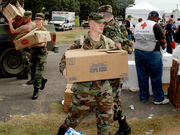Post Doomsday[]
While receiving few strikes on Doomsday, Oregon fared little better than other states. While two of the strikes were low yield bombs targeted at isolated military facilities at Adair Air Force Station and Mt Hebo, the largest urban center of the

National Guardsmen held distribute aid in the Aumsville and Silverton camps.
state, Portland, received a direct hit. With the Portland Metro area containing two thirds of the entire Oregon state population, this despicable act was in fact what saved much of the remaining population having a much smaller population to feed. Following the strikes the Oregon state government called on the National guard to aid in keeping order. With Portland hit, it was only a matter of time before swaths of refugees would begin heading southward to the unaffected areas of the state, and the Governor aimed to ensure his state survived. When refugees began pouring in to Salem the National Guard began herding them towards refugee camps set up near Aumsville and Silverton. As these camps filled and more survivors arrived, the National Guard began pulling from local police forces as well as volunteer militia in order to keep up. While relative order was kept for the first few weeks, as people in the camps began to succumb to wounds and radiation sickness unrest grew and the state government began pulling more National Guard reserves from the southern Oregon towns, as well as some local police from the same communities. With little law enforcement, dwindling resources, and a growing refugee population from those not wanting to settle in the camps near Salem, the southern townships began to devolve and unwilling to redirect resources from what was considered a much more important. Left to themselves many of the southern towns began fortifying themselves from the refugee mobs and the small gangs that had begun to rove the area with the lack of law enforcement.
Aumsville Massacre[]
In 1985 as unrest built and supplies began to dry up, and with no more food imports, the Governor was forced to use guardsmen troops to aid in securing supplies from the local growers of the Willamette valley. As the expeditions moved southward, Corvallis was found to have suffered heavily from the fallout from Adair AFS, and a contingent of guardsmen were left to aid the populace. As the guardsmen moved south the more lawless the area was, and heavy resistance to government troops due to the pullout of troops and law enforcement to protect Salem was encountered south of Eugene. It was decided that Eugene would be the southernmost outpost of the state troops. With so many troops pulled out of the refugee camps around Salem in order to procure supplies for the populace, it began to get more difficult to maintain order. On july 7th 1986 riots broke out in the Aumsville camp. As the riots threatened to spread and the guardsmen struggled to regain control a rioter struck a guardsman in the head with a makeshift club, killing him. The other guardsmen with him, enraged, opened fire on the rioter. The shots fired caused mass confusion and many of the less seasoned guardsmen began opening fire as well. Fighting began in earnest at that point, but the National Guardsmen, despite the stress and confusion, managed to hold off the enraged rioters and in the end after nearly 6 hours of intense fighting, the riot ended. Almost 900 refugees were confirmed dead, with another 1200 injured. This event fractured popular support for the government.
Unrest Builds[]
After the Aumsville massacre support for the government began to degrade. Although much of the populace accepted the incident as necessary to maintain order in these desperate times, and were thankful for the government's efforts to ensure food was

Firefighters put out a car that was torched during the Salem Riots
supplied to the people, a large group saw the incident as the final failure or a government on the decline. Many began calling for an election, as the state of emergency declared following Doomsday had postponed any elections indefinitely. The governor and legislative assembly denied requests for an election, stating that the situation was still too delicate and unruly for an election. The denials of a renewal of democracy caused a rift in the populace, some agreed that the situation was too chaotic for elections, and agreed with the actions of the National Guard in Aumsville, while others strongly believed that democracy was too important to be delayed. Protests began occurring regularly in Salem calling for elections and the unrest finally hit its breaking point on October 3rd 1987. During one of the protests around Salem, some protesters began to get violent, one throwing a molotov cocktail towards the Capitol building. While the projectile fell far short and did nothing but start a small contained fire, the National Guard in charge of maintaining the security of the building were ordered to fire on the crowd in order to disperse them and send a message. The commander of the stationed guards, one Lieutenant Cole Grant, upon hearing the order told his guardsmen to stand down. Declaring that he joined the guard to uphold Democracy in America, not stifle it he walked off duty, his fellow guardsmen followed. With no one guarding the building, several protesters broke from the group and stormed the doors. The incident resulted in several State Senators being attacked and a clerk was hospitalized. Lt Grant and his men were court martialed and imprisoned for dereliction of duty.
When word of the incident reached the populace their were outraged. Not only did the government order troops to fire on civilians, the man who by rejecting the order had saved lives, was punished for doing so. An armed mob marched on the holding facility where Grant and his men were held and demanded their release. When their demands were not met, the group stormed the building, the guards opened fire on the mob, killing several, but were quickly overrun. Grant and his men were released by the mob, but more damage had been done than the mob ever thought possible. The Governor declared martial law, but many of the national guardsmen deserted, joining Grant and his men. Slowly the populace began to divide

A National Guardsman patrolling.
between the State Government, generally those advocating for strong central authority in order to get through the crisis brought about by Doomsday, and those who became known as The Deserters, who demanded the immediate resignation of the Governor and new elections. By 1990 the Governor had solidified his base, including most of the military personnel. Laws were passed guaranteeing special rights for the military, including law enforcement, in exchange for their loyalty. Military personnel became the new upper class. The friction between the two sides finally came to blows over the killing of a girl in the city of Albany. The girl, one Jenna Williamson, was caught stealing food for her family by a local police officer. When confronted she attempted to flee causing the officer to open fire and kill her. When the matter was investigated it was found that the officer was in the right and that extreme measures are sometimes necessary to keep order. Riots soon engulfed Albany and the National Guard was called in to keep order. When ordered to put down the riots with deadly force if necessary, nearly one third of the guardsmen refused and attempted to desert. Many were shot at by their own fellow guardsmen under orders. Word of this spread to other towns and cities and opponents of the government began to organize in Eugene. Since the government would not resign and call for new elections, then the people decided to take action to force the government out. The rebel movement started slowly, recruiting in the south and moving north, but it wouldn't be until the recruitment of Lt Cole Grant himself would it break into full out civil war.
Civil War[]
Being a symbol of defying the unjust Governor and the powerful military class he had created to cement his power, Cole Grant's recruitment to the cause became a rallying cry to those who were sick of the increasingly authoritarian regime of the Governor. More people joined the cause and on March 3rd 1998, the rebels took the city of Eugene. With the city in their hands any National Guardsmen who had surrendered were given the chance to renounce the Governor and join the rebels, who called themselves the Oregon Democracy Coalition. Any who did not do so were stripped of their equipment and forced out of the city. While this made sense politically, strategically it gave the Governor's forces more experienced troops and insight into the enemy. The ODC would gain ground significantly in the south over the next few years, but with mostly untrained civilians with a few trained national guardsmen, the fight was long and brutal. Eventually the ODC would manage to take Salem after a long battle in 2002, but it would be a costly victory. With the center of government in their hands the ODC got complacent, many thought the fight would be over but with no centralized stronghold, government forces began switching to guerrilla tactics that bloodied the ODC's noses. In 2006 representatives from both sides met in the remains of the town of Beaverton to hammer out the details of a truce. Government forces were to stay north and west of highway 18 and 99W, and a demilitarized zone would be created along the route.
New Status Quo[]
With the declaration of a ceasefire, representatives from each side met to discuss a more long term peace treaty. The terms of the treaty were thus:
- The Governor renounces all claims to the state of Oregon south and east of Highways 18 and 99W.
- The government of the northern Oregon State, furthermore referred to as Astoria, after the current administrative center, renounces claim as successor to the State of Oregon.

Political Situation in Oregon as of 2010
- Astoria recognizes the establishment of the Free State of Oregon, and recognizes its claim to the remainder of Oregon south and east of highway 18 and 99W
- The Free State of Oregon recognizes the claim of Astoria to the territory north and west of highway 18 and 99W.
- The Free State of Oregon renounces all claim to the territory north and west of highway 18 and 99w.
- The territory of Portland will be jointly administered if rebuilding occurs.
- The demilitarized zone will be maintained for 25 years to ensure the continued security of both nations during a period of reconstruction
- Citizens of both states have a period of two years in which they may migrate between states freely, after which their citizenship will be that of their state of residence.
The treaty, known as the Beaverton Compact, was signed by representatives of both states.

